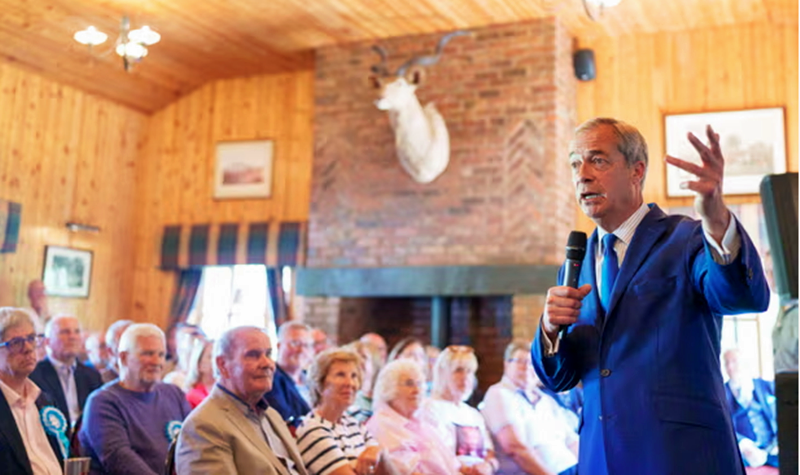Could Nigel Farage become the next Tory leader? In some ways, he already has

By Guardian- Samuel Earle - Mon 24 Jun 2024 11.00 BSTShare
Rather than providing a check on the far right, the party opened the door to Faragism – and made Samuel Earles fantasies come true.
It’s easy to mock Nigel Farage: a cartoonish nationalist who’s made more comebacks than any pop star, who’s failed to win a seat in Westminster on seven different occasions, and whose urgent mission to save Britain from disaster doesn’t stop him selling bottles of “Farage gin” on the side (£40). Farage is aware of this mockery, too – and you sense a desire for revenge is partly what motivates him. As he infamously told the European parliament after the 2016 referendum, “When I came here 17 years ago … you all laughed at me – well, I have to say, you’re not laughing now, are you?”
Even influential Conservatives – who desperately consume whatever Farage is selling, praying his followers will be included in the deal – heap insults on him. Michael Gove recently likened Farage to a clown or showman – a source of “amusement and diversion” – and called Reform UK “a giant ego trip”. David Cameron says that Farage is “trying to destroy the Conservative party” and offers only “inflammatory language and hopeless policy”, having previously called his supporters “fruitcakes and loonies and closet racists”.
Farage’s friendly comments about Putin on Friday – that Nato and the EU “provoked” Russia’s invasion of Ukraine – has provided fresh opportunities for them to take the moral high ground. But Conservatives never square this condescension with their capitulation to his demands. Why, despite being in power for 14 years with ever bigger majorities, have they let Farage make such a strong claim to being the most influential politician of the period?
Looking back on the soap opera of British politics since 2010, it is Conservative prime ministers who make cameo appearances, and Farage who is the arch protagonist, shaping events, sealing fates, hogging the media’s attention.
Now, as this series of Tory rule draws to a close, Farage is claiming that he wants to kill off the same Conservative party that has granted his every wish. There’s a strong sense of deja vu: in Reform, Farage is leading his third different party in four elections; immigration is again being framed as a national emergency, after a brief pause; and the “smug, complacent and snobby” Cameron, as he put it in a recent Daily Telegraph column, is again the target of Farage’s ire.
But there is one major novelty. Farage’s party has overtaken or drawn level with the Tories in many polls. In the past, Conservatives liked to say that a vote for Farage was a vote for Labour. Farage now says, gleefully, that a vote for the Conservatives is a vote for Labour. “A Tory vote is a now wasted vote – we are now the real opposition,” he declares. Who’s laughing now?
As ever, Conservatives are split over what to do with the former City broker. While figures such as Suella Braverman and Jacob Rees-Mogg are eager to incorporate Farage and his crowd into the Tories’ electoral coalition, others – from Cameron to Kemi Badenoch – are steadfastly opposed. The Conservatives know this conundrum well. In their quest to defeat Labour, a question recurs throughout the party’s history: how to maintain an aura of respectability, and thus keep its moderates on side, without losing voters to parties further on the right?
This often results in awkward acrobatics. In the interwar period, with socialism and the Labour party on the rise, the press barons Lord Rothermere and Lord Beaverbrook launched the United Empire party to challenge the perceived centrism of “semi-socialist” Stanley Baldwin. Like Reform, the movement was a reactionary cry for recognition, and its leaders also claimed to want the Conservatives’ extinction.
In response, Baldwin cautioned his divided party against the allures of fascism and demagoguery, even as he pandered to xenophobia – his home secretary between 1924 and 1929, William Joynson-Hicks, was described by the Jewish Chronicle at the time as “the most avowed and determined antisemite in the House of Commons”.
Enoch Powell later demanded a similar balancing act from the Tory leadership. After Powell’s “rivers of blood” speech in 1968, Ted Heath kicked him out of the shadow cabinet but kept him in the party. While Powell was a liability and a threat to Heath’s leadership, he was also an electoral asset – someone who could attract “to his banner the anti-blacks, hangers, floggers, censors and the martinets, who support him”, as the Spectator observed in 1969. Every vote counts.
Margaret Thatcher navigated the same challenges. During the 1979 election, when the Conservatives fell to level with Labour in the polls and the National Front was a noisy presence to her right, she leaned into Powellian language about Britain being “swamped” by people “of a different culture”, even calling for “an end to immigration”. A member of her team protested privately: “Just imagine if she’d said we were being swamped by Jewish people.”
But as her popularity spiked, the National Front was outraged for different reasons: plagiarism. “‘Thatcherism’ as a hardline new brand of Conservative policy … stole votes from the National Front by stealing – or appearing to steal – NF policies,” cried National Front News on its front page, a few months after her victory.
The Conservatives justify these contortions by arguing that if they weren’t there to acknowledge these views, they would carry Britain to even darker places. But for the past decade, far from being a check on the far right’s power, the Conservatives have opened the door for it, allowing fringe reactionary interests to swamp Britain’s culture and politics.
Leaving the European Union, tying all overseas aid to foreign policy interests, trying to send asylum seekers to Rwanda, prioritising funding for the armed forces – all these policies would be at home in a Thatcher-era National Front manifesto, and they are all now promoted by the Conservative party. The Tories might bicker over whether Farage has a place in their party, but in truth they made their peace with Faragism long ago: lax on inequality and authoritarian on immigration, with a few kind words about the NHS thrown in, sums up the Tory strategy for most of the past 50 years.
Could Farage become leader of the Conservatives? One tempting answer is that he already has. But as this bruising phase of Tory government has taught us, things can always get worse. A Conservative party featuring Farage anywhere near its leadership would be a more reactionary mainstream force than Britain has ever seen in modern history. Is this what Farage is working towards? Does he want to destroy the Conservative party and rebuild it in his image, or simply flog a few more bottles of gin?
Unless Farage thinks the Conservatives will get even fewer than Reform’s half-dozen or so expected seats, his claim to being the opposition is bluster. But Farage didn’t get where he is by understating his influence and, more worryingly, the Tories have an unhappy habit of making his outlandish fantasies come true.
- Samuel Earle is the author of Tory Nation: The Dark Legacy of the World’s Most Successful Political Party
- Guardian Newsroom: Election results special. Join Gaby Hinsliff, John Crace, Hugh Muir, Jonathan Freedland and Zoe Williams on 5 July.

- Samuel Earle is the author of Tory Nation: The Dark Legacy of the World’s Most Successful Political Party.
